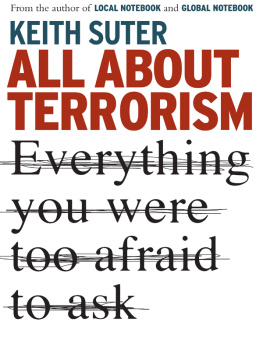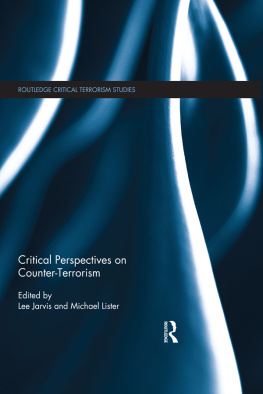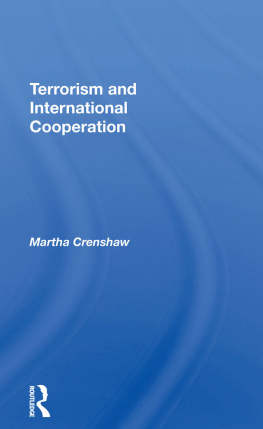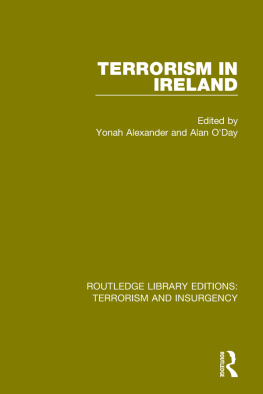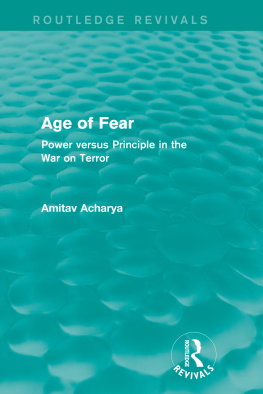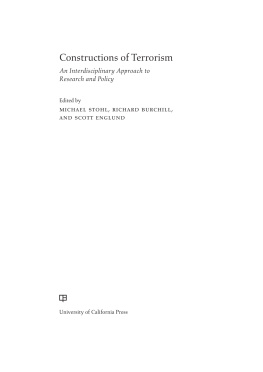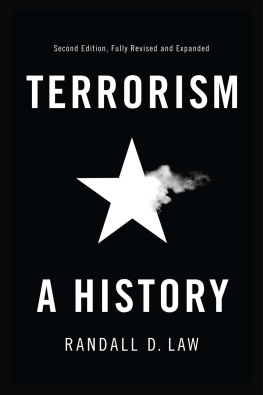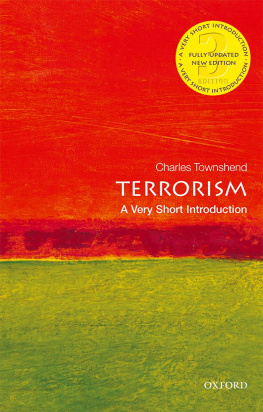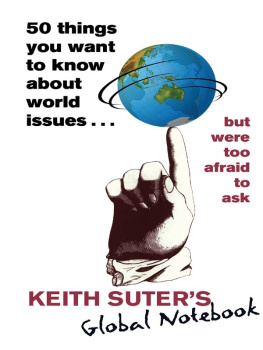
D R K EITH S UTER is the foreign affairs expert on Sunrise , the number one Australian breakfast show, appearing on his own segment, Global Notebook. A social commentator, strategic planner, conference speaker, writer and broadcaster, Keith is also a foreign affairs analyst for Sky TV Australia and Radio 4BC, Brisbane, and can be heard on Australian radio on an average of once a day.
Since 1993 Keith has been a member of The Club of Rome, a global think tank on economic and environmental matters, and he currently lectures at the department of politics and international relations, Macquarie University.
Other books by Keith Suter available from Bantam
50 Things You Want to Know About World Issues
But Were Too Afraid to Ask: Keith Suters Global Notebook
Keith Suters Local Notebook:
50 Things You Want to Know About Australian and
World Issues But Were Too Afraid to Ask

All rights reserved. No part of this book may be reproduced or transmitted by any person or entity, including internet search engines or retailers, in any form or by any means, electronic or mechanical, including printing, photocopying (except under the statutory exceptions provisions of the Australian Copyright Act 1968 ), recording, scanning or by any information storage and retrieval system without the prior written permission of Random House Australia. Any unauthorised distribution or use of this text may be a direct infringement of the authors and publishers rights and those responsible may be liable in law accordingly.
All About Terrorism: Everything You Were Too Afraid To Ask
ePub ISBN 9781742745848
A Bantam book
Published by Random House Australia Pty Ltd
Level 3, 100 Pacific Highway, North Sydney NSW 2060
www.randomhouse.com.au
First published by Bantam in 2008
Copyright Keith Suter 2008
The moral right of the author has been asserted.
All rights reserved. No part of this book may be reproduced or transmitted by any person or entity, including internet search engines or retailers, in any form or by any means, electronic or mechanical, including photocopying (except under the statutory exceptions provisions of the Australian Copyright Act 1968 ), recording, scanning or by any information storage and retrieval system without the prior written permission of Random House Australia.
Addresses for companies within the Random House Group can be found at www.randomhouse.com.au/offices
National Library of Australia
Cataloguing-in-Publication Entry
Suter, Keith D.
All about terrorism.
ISBN: 978 1 74166 821 6 (pbk.)
Terrorism.
Political violence Case studies.
September 11 Terrorist Attacks, 2001 Influence.
War on Terrorism, 2001
World politics 21st century.
303.625
Cover design by Josh Durham at design by committee
CONTENTS
INTRODUCTION
LIVING WITH TERRORISM
I have been living with terrorism, so to speak, for over thirty years. I lived through the onset of the IRAs violence in the UK in the late 1960s and early 1970s. My first doctorate, on the law of guerrilla warfare, examined international attempts to outlaw terrorism and included research in Northern Ireland and South Vietnam. I am now onto my second wave, following the September 11, 2001 attacks in the US.
During the intervening period, there has been a revolution in military affairs, but it is often overlooked, particularly by those in the armed forces who yearn for a return to the proper soldiering of the past. After World War II, the major powers suffered a form of nuclear blindness, whereby they could not see much beyond the Cold War nuclear threat, and so have been slow to recognise the looming threat of complex irregular warfare. I sometimes think that guerrilla groups are better than the conventional forces at learning the lessons of history and from each other about what innovation works.
In this book, I argue that creative thinking is required to cope with this new era of warfare. I discuss examples of how events since September 11 could have been handled differently.
The book has four parts. Part I seeks to define terrorism. Part II views terrorism as part of complex irregular warfare and explores its history. Part III examines some of the techniques now being used or which could be used in this new era. Part IV links the current concerns with some wider dimensions.
The bad news is that terrorism is here to stay, at least for the foreseeable future. The underlying conditions that bred terrorism, such as poverty and racism, will long continue to exist. Terrorist groups cannot be eliminated simply by creating additional laws. Passing new laws may have a therapeutic effect, reducing public anxiety and quietening the media, but terrorists are often smart opportunists, looking for gaps to exploit in national security systems. They try to be one step ahead. Meanwhile, excessive legislation will simply erode the human rights of the people being protected. An attorney-general introducing new laws could be accidentally assisting the terrorists destroying hard-fought-for human rights in the interests of trying to save society.
The good news is, first, that the world is getting safer. Conventional warfare at least as we knew it in the twentieth century is on the way out. Far more people were killed in the first half of the twentieth century than in the second half. Warfare is now far less labour intensive. Its nature has changed and so fewer people are being killed overall, although there are more civilian fatalities as a percentage of the total number of deaths.
Second, the current wave of terrorism will subside. It always does. Prevention techniques will be improved, community opinion will turn against the violent groups, the groups themselves will have less appetite for violence and they may have fewer grievances as appropriate economic, social and political reforms are introduced. There could be any number of reasons. But, going on the past record, we do know that gradually the problem will decline. Until the next time.
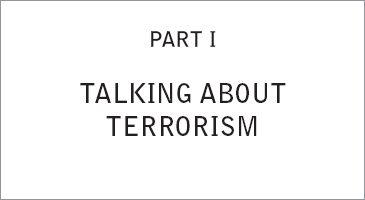
CHAPTER 1
TERRORIST OR FREEDOM FIGHTER?
The word terrorism is virtually meaningless. I use it because I have to: in my television and radio programs, the audience expect to hear it. But the word is too vague to be of much use and so I warn people that if they do use it in conversation or elsewhere, they should make sure that they and their listeners all know how the term is being used.
I prefer the term complex irregular warfare. It is not vague and emotive like the word terrorism, and it is accurate, too: the new era of warfare is complex, and the fighting is irregular (as distinct from the standard conventional forms of war). Still, I am realistic enough to know that, although it is a more descriptive term, it is too long and too abstract to be used not least by my colleagues in the media, for whom the word terrorism rolls easily off the tongue.
The basic problem with trying to coordinate a global response to terrorism is that there is no agreed definition of it. One persons terrorist is another persons freedom fighter. There is no consistent usage of the term, even at a national or international level. Indeed, it is possible for a person to move from terrorist to freedom fighter and eventually become a head of government. Many of the first generation of leaders of the new countries created out of the former British and French colonies had served time in prison or been on the run for offences which their colonial masters regarded as one form of terrorism or another. One example is George Washington, who was commander-in-chief of the American revolutionary forces before he became the first president of the United States.

